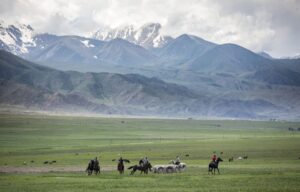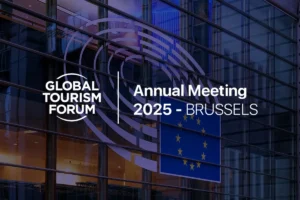From Regional Player to Global Connector: The Evolution of Turkish Foreign Policy

Over the past two decades, Türkiye has quietly transformed the way it engages with the world. Ankara, previously focused on European and Middle Eastern neighbours, has evolved into a country with global influence, active in Africa, Asia, Latin America, and beyond. It did not happen all at once. It is the result of a stable foreign policy that incorporates strategic autonomy, economic diplomacy, and humanitarian values. Türkiye has mastered how to use its geography, economy, and culture to become a bridge between regions and ideas, bringing together the Global North and South, the East and West, and the developed and developing worlds.
Today, Türkiye is not just reacting to events near its borders; it is helping shape global discussions on energy, trade, migration, and sustainable development. Its diplomacy has matured, and with that, Turkey has become one of the world’s key middle powers.
A Global Network of Partnerships
Türkiye’s new foreign policy can be seen most clearly in its expanding network of partnerships. In Africa, Asia, and Latin America, Turkish embassies, businesses, and aid agencies are more visible than ever before.
For example, Türkiye’s embassy network in Africa has grown from only 12 in 2002 to more than 45 embassies today. Turkish Airlines, which now flies to over 60 African destinations, plays a major role in connecting the continent with the rest of the world through Istanbul. Trade between Türkiye and Africa has increased more than fivefold in the past two decades, reaching nearly $40 billion by 2023 (according to the Turkish Ministry of Trade).
The same pattern is visible in Asia. Through its Asia Anew Initiative, launched in 2019, Türkiye seeks to strengthen cooperation with countries in East and Southeast Asia on technology, education, and culture. With China, Türkiye cooperates under the Belt and Road Initiative (BRI), linking it to transport projects such as the Middle Corridor, which connects Asia to Europe through the Caspian region and Türkiye’s own railways and ports. Türkiye has also deepened ties with Latin America. New embassies, trade missions, and cultural institutes have been established across the region, while Turkish television programmes, a soft power export, are phenomenally popular in countries like Chile, Mexico, and Argentina.
It is the reflection of Türkiye’s multifaceted diplomacy that it engages with everyone, without being tied to a single bloc or ideology, and maintains close relations with NATO and the EU while also forming alliances with the Organization of Turkic States, Gulf countries, and developing countries across the Global South.
The Organization of Turkic States (OTS), established in 2009,has become an important platform for Türkiye’s regional engagement and leadership. Through this forum, Ankara collaborates with Azerbaijan, Kazakhstan, Uzbekistan, and Kyrgyzstan to promote trade, transportation, and cultural cooperation throughout the Turkic world. The OTS also reflects Türkiye’s efforts to foster solidarity among countries with shared historical and linguistic ties, resulting in a stronger regional identity that complements its global presence.
Soft Diplomacy through Development and Exchange
One of the core elements of the development of Türkiye’s foreign policy is its cultural and humanitarian diplomacy. The country has positioned itself as one of the world’s leading sources of international aid, both in terms of development projects as well as emergency relief.
The Turkish Cooperation and Coordination Agency (TİKA) operates in over 150 states, building schools, hospitals, and water systems. The Disaster and Emergency Management Authority (AFAD) and the Turkish Red Crescent have become the most prominent responders to humanitarian crises, from earthquakes in Asia to floods in Africa.
Based on OECD data, Türkiye consistently ranks among the top five donors globally in terms of official humanitarian assistance as a share of GDP. Such generosity bolsters its standing as a humane nation that supports peace and development.
Culturally, Türkiye uses education and media to build long-term connections. The Yunus Emre Institutes promote Turkish language and culture worldwide, while thousands of international students enroll in Türkiye Scholarships at Turkish universities every year. Mostly graduates go back home with pleasant experiences and memories, instilling deep affection towards Türkiye.
Even popular culture contributes to this image. Turkish TV shows and movies are watched by millions of people worldwide, helping spread the country’s new identity and values across continents, which is a notable example of soft power success.
Balancing Power and Principle
Türkiye’s increasing global role is not just about engagements; it is also about independence and balance. It has learnt to negotiate with major powers while keeping its own national interests at the forefront.
For instance, even when the EU and Russia don’t see eye to eye, Türkiye stays connected to both Türkiye continues to play a central role in NATO, even as it expands its defense ties with non-Western partners. This approach, often called “strategic autonomy”, allows Türkiye to act flexibly in an unpredictable world.
A NATO member with strong ties to non-Western partners gives Türkiye a unique position in global affairs. This dual identity helps it act as a bridge between the West and the Muslim world, engaging in Western security frameworks while maintaining open dialogue with countries in the Middle East, Central Asia, and Africa. By balancing both spheres, Türkiye demonstrates that cooperation between civilizations is not only possible but also beneficial for global stability.
In the energy sector, Türkiye’s location makes it a natural gateway between producers in the Caspian and Middle East and consumers in Europe. Projects like the TurkStream pipeline and the Trans-Anatolian Natural Gas Pipeline (TANAP) underscore its role as a secure and diversified energy corridor. Along with this, Türkiye is also investing in renewable energy and green technologies to facilitate the global energy transition.
Türkiye is now playing an active role in peacemaking and mediation. It has hosted negotiations on conflicts from Ukraine to the Middle East and supports UN peacekeeping missions in several regions. The aforementioned steps are an expression of a dialogue-based foreign policy, which reflects its expanding role as a global link.
To conclude with, Türkiye’s rise as a global connector is the prime example of how the middle powers can reshape international affairs through cooperation, trade, and innovation, rather than domination.
Türkiye has gained trust and respect of the world by pursuing an independent foreign policy, building transportation corridors that link continents, and supporting humanitarian activities around the world. Its balanced strategy allows it to be a bridge, not just between geographical regions, but between ideas also. As the world struggles with new challenges Türkiye’s experience shows that pragmatism and solidarity are more valuable than division. The country’s evolution from a regional power into a global connector is not only a success story for its people but also a model for other nations attempting to balance national interests with international responsibility.


